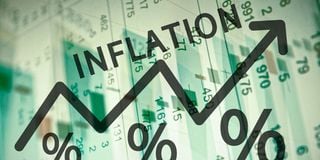Inflation eases to 7.3pc on lower food, power and cooking gas prices

Inflation dropped for the second consecutive month to 7.3 per cent.
Inflation fell for the second consecutive month to 7.3 per cent in July as lower prices of food, cooking gas and electricity defied the sharp rise in fuel prices during the month.
According to the Kenya National Bureau of Statistics (KNBS), this is the lowest year-on-year inflation rate since May last year when it stood at 7.1 per cent and a significant drop from 7.9 per cent in June.
Between June and July, the price of Irish potatoes fell the most, by 12.2 per cent, with a kilogram selling for Sh89.07 in July, down from Sh101.41 the previous month.
The price of tomatoes fell by 10.1 per cent, cowpeas by 8.3 per cent, 250-millilitre milk by 1.1 per cent, cabbages by 8.1 per cent and carrots by 6.1 per cent.
Another factor in the easing of inflationary pressures was electricity, the price of which fell by 5.3 per cent, with 50 units selling for Sh1,320 compared to Sh1,394 in the previous month.
The price of cooking gas also fell by 9.2 per cent with a 13kg cylinder selling for Sh2,787 in July compared to Sh3,069 in June.
Overall, year-on-year inflation was driven by a 13 per cent increase in the cost of transport in July 2023 compared to July 2022, while the cost of food and non-alcoholic beverages rose by 8.6 per cent over the same period.
Meanwhile, the index for housing, water, electricity and gas rose by 7.8 per cent.
"The monthly index for food and non-alcoholic beverages fell by 0.5 per cent between June 2023 and July 2023. Prices of most food items declined during the period," KNBS said.
July's inflation defied the rise in fuel prices after the Energy and Petroleum Regulatory Authority (Epra) doubled the value-added tax (VAT) on the commodity from 8 per cent to 16 per cent, leading to a significant increase in fuel prices.
According to KNBS, the price of a litre of diesel rose by 7.4 per cent, petrol by 6.9 per cent and kerosene by 5 per cent in July, following Epra's price review, which led to a sharp rise in transport costs.
"The transport index increased by 3.5 per cent between June 2023 and July 2023, mainly due to the increase in petrol and diesel prices, which rose by 6.9 per cent and 7.4 per cent respectively. During the same period, fares for some public transport routes increased (by 16.7 per cent)," KNBS said.
This comes at a time when the International Monetary Fund (IMF) has identified commodity price volatility as one of the 13 key risks facing President William Ruto's government. The bank said commodity price volatility could lead to higher commodity prices and weigh on economic growth.
The lender says this could happen if Kenya's trading partners impose export restrictions and other supply disruptions.
The IMF says the likelihood of this risk materialising is high and has advised Kenya to respond by tightening monetary policy to tame inflation and reducing subsidies on items such as fuel to keep prices in line with global trends and reduce fiscal pressure on the treasury.
"If the further shock is very large, consult with staff on a response that is consistent with the overarching objective of fiscal consolidation to reduce debt vulnerabilities," the lender said.
The Monetary Policy Committee (MPC) in June, during CBK Governor Dr Kamau Thugge's first MPC meeting as governor, raised the Central Bank Rate (CBR) from 9.5 per cent to 10.5 per cent in a bid to tame inflation.
The move saw lenders quickly announce higher interest rates on both new and existing Kenya Shilling-denominated loans as the CBK raced to tighten credit.
In May last year, the CBK resumed the gradual upward adjustment of the CBR from 7 per cent to the current 10.5 per cent to tame inflation, signaling the highest lending rates in almost five years.





